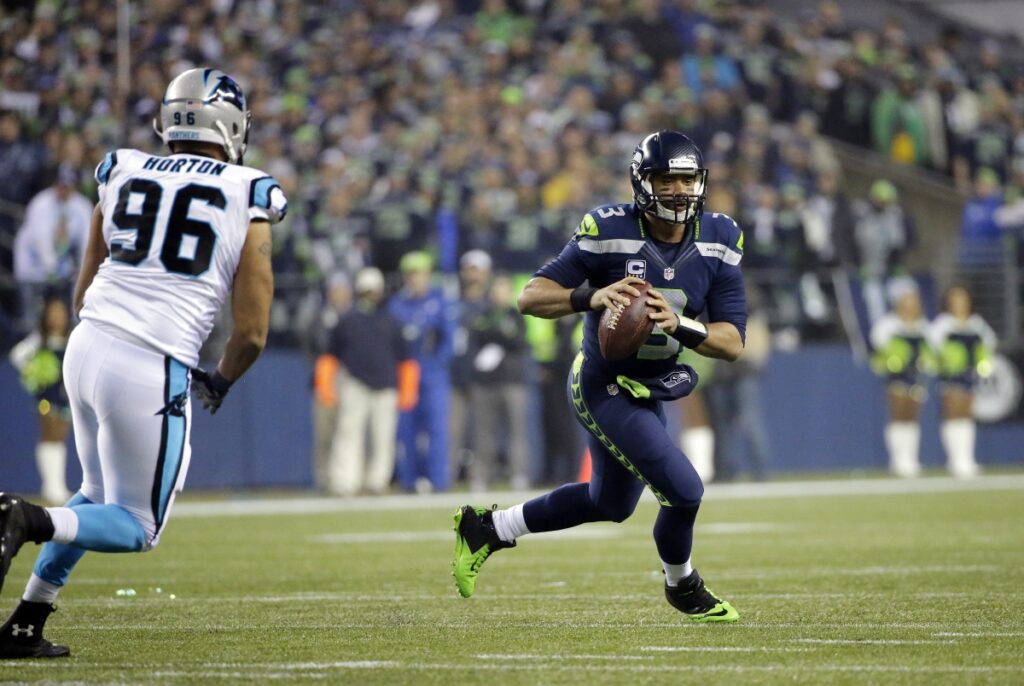Peterson, Bryant & Demaryius Thomas Show Leverage (Not Compliance) Seals the Deal
It is with a heavy heart that I must emphasize this point before delving in: my admiration for Russell Wilson, the player, knows no bounds.
From all accounts and the resounding sentiments of fellow players, Russell Wilson, the individual, is as deserving of admiration as any gentleman in the league.
Nevertheless, when it comes to Russell Wilson, the negotiator, there is room for constructive criticism.
Personally, and in line with the overarching ethos of this platform, I firmly believe that, as a default stance, we ought to lend our support to what is ultimately in the player’s best interest.
After all, they are the ones putting their bodies on the line. However one looks at it, considering the caliber of player that Wilson is, it is disheartening to witness him willingly accept what might be deemed the NFL’s most unfavorable deal.
In a game where a career can vanish in the blink of an eye, this is undeniably not in the player’s best interest.
In a rather intriguing turn of events last week, two prominent pass catchers, Demaryius Thomas of the Denver Broncos and Dez Bryant of the Dallas Cowboys, secured remarkably similar blockbuster deals just shy of the franchise tender signing deadline.
Both players were extended franchise tags but opted not to commit, holding out in pursuit of more extended contracts.
Their absence from off-season team activities underscored the gravity of their commitment to this cause.
The strategic use of public messaging, emphasizing the potential ramifications of lost games in the upcoming season without a fresh contract, was a shared approach by both parties.
You might vividly recall encountering these messages across various social media platforms.
As much as I love football…on my beautiful babies.. I apologize #cowboynation but I will not be there if no deal #fact
— Dez Bryant (@DezBryant) July 13, 2015
As for Demaryius Thomas, I was asked if he’s willing to miss games. Don’t rule it out. He won’t be at camp on time if no deal is reached
— Ian Rapoport (@RapSheet) July 14, 2015
Naturally, the negotiations for both parties witnessed numerous ebbs and flows, ultimately culminating in successful agreements.
Throughout the process, there were no alternative offers, which ultimately matched the terms that were eventually inked.
It’s undeniable that the looming deadline, coupled with the potential absence of each team’s primary playmaker, played a significant role in driving the negotiations toward the players’ desired outcome.
Without taking the resolute stance they did, these players wouldn’t have secured the lucrative deals they now have. This is an indisputable fact.
In the absence of pressure, teams seldom extend terms without careful consideration. Unfortunately, that’s just the reality of business – and life.
No player is worth a certain amount solely because of what they’ve done. You’re worth what you’re willing to play for. Right now, Wilson is telling Seattle he’s worth $1.5 million.
Minnesota Vikings running back Adrian Peterson took a more direct approach in publicly pressing for increased guarantees in his current deal.
He not only voiced his dissatisfaction but also distanced himself from the team.
While the deal was eventually reached upon his return and reintegration, he allowed the team to operate without him for an extended period to emphasize his commitment to the matter, showcasing what a team without his invaluable contribution would look like.
Whether his approach was justified in his specific case is now moot. He effectively demonstrated his football value and the gravity of his stance.
This absence played a crucial role in leveling the negotiation playing field. Had Peterson been present, any threat to prompt this deal would likely have lacked substance and may not have resulted in the current resolution.
Such developments can be considered somewhat callous, and they may not align with every individual’s disposition, such as Russell Wilson.
However, it’s an intrinsic aspect of the negotiation process. If you don’t engage in this strategic dance, anticipate that your final terms may be less favorable than they could have been—or, potentially, there may be no new deal at all.
What Can Wilson Do?
The negotiation saga surrounding Russell Wilson’s long-term deal has seen its share of highs and lows.
There was a moment of hopefulness after the season when Seahawks GM John Schneider hinted at a groundbreaking agreement for Russell, which would potentially be characterized by unprecedented guarantees rather than sheer monetary value.
It sounded promising, but it never materialized.
As reports have made clear, Wilson is aiming for the top dollar. It goes without saying that top-tier compensation is not simply handed out in the realm of business or the NFL without some form of pressure.
While Russell has dutifully participated in all off-season activities and has made numerous public statements, both personally and through his agent, affirming his willingness to play this year for a relatively modest $1.5 million salary, this alone hasn’t spurred any substantial action.
Unsurprisingly, the Seahawks seem content to let this scenario play out.
Without tangible consequences prompting a shift, it’s wishful thinking to expect NFL negotiations to function differently.
If the Seahawks could maintain Wilson’s current salary indefinitely, they very well might.
Relying solely on a player’s past performance metrics and win percentages to determine their value overlooks a crucial factor: a player is valued at what they are willing to play for.
Presently, Russell Wilson is signaling to the Seahawks that he values himself at $1.5 million.
Unfortunately, this might be the figure he ultimately secures—especially with the prospect of a franchise tag looming.
Like any team, the Seahawks are inclined to act in their best interests until external pressures necessitate otherwise.

If Russell Wilson’s ultimate objective is securing the deal he desires, he may have made some strategic missteps thus far.
Opting out of off-season activities would have undeniably applied substantial pressure on the Seahawks to expedite negotiations.
However, in their absence, Seattle adhered to the expected course of action: inactivity.
The veiled suggestions of pursuing baseball likely didn’t register as significant concerns for the Seahawks’ leadership.
Consequently, Wilson is expected to dutifully report for training camp as usual, indicating that substantial changes in this situation are unlikely.
It’s important to acknowledge that not every NFL player can employ the tactic of non-participation to induce a deal, as most players are replaceable.
However, Demaryius Thomas, Dez Bryant, and Adrian Peterson fall into a different category.
For Russell Wilson to command a salary commensurate with the league’s top players, he must demonstrate to his team that he is, in fact, indispensable.
Otherwise, he could be viewed as a $1.5 million player—a respectable position in its own right.
If a role player like myself could employ my suggested tactics, any team would likely bid a swift farewell.
Russell Wilson’s value far surpasses that, but he cannot expect compensation at that level unless the team feels compelled to do so.
The absence of their quarterback during training camp would be profoundly disruptive to any NFL franchise.
At this juncture, this constitutes tangible leverage, irrespective of his current contractual status.
Contract talks between @DangeRussWilson, @Seahawks to end at start of camp (via @RapSheet): http://t.co/XTH6Ffu5YI pic.twitter.com/L7TcUwRG1o
— NFL (@NFL) July 16, 2015
Without the luxury of a franchise tag deadline like some of his peers, Wilson must create his sense of urgency.
This entails withholding his presence from training camp until a new arrangement is reached.
At the very least, if a long-term extension remains elusive, a brief absence from camp should prompt a bridge one-year upgrade, aligning him more closely with his counterparts while paving the way for future negotiations.
If Wilson fails to wield his leverage, he effectively relinquishes it. And without power, securing top-tier deals becomes improbable, if not impossible. That’s an unassailable reality.
The deals you secure are a direct reflection of your negotiation acumen.
Revealing your hand without applying pressure as a tactic usually results in the kind of deal Wilson currently holds.
Wilson possesses remarkable intelligence and a strong sense of responsibility.
However, if his aspiration to own and lead an organization ever materializes, a future version of himself would assuredly offer present-day Russell a crucial piece of advice: deal terms are propelled by pressure and deadlines.
No wise sports franchise owner would readily assent to the reported terms Wilson seeks without exerting player-driven leverage. Leverage that remains dormant in your pocket is effectively non-existent.
Ultimately, one can only hope that everything aligns favorably for Wilson and he secures a just deal.
The conclusion of this negotiation saga will hinge on Wilson’s ability to negotiate as shrewdly as he is being dealt with…

